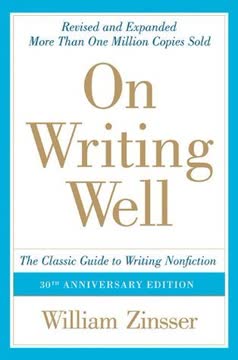Searching...
Top 10 Books for Mastering Scientific Writing
Discover the 10 best books to elevate your scientific writing skills and communicate complex ideas effectively.
Book Summaries
This timeless guide by Strunk and White provides essential rules for writing clearly and effectively, making it indispensable for scientific writers.
3 Key Takeaways:
- Creativity stems from the deep human desire to be heard and understood
- Tap into your "Big Why" to unlock your creative potential
- Embrace desire as the root of creativity and motivation
The Classic Guide to Writing Nonfiction
William Zinsser's classic guide emphasizes clarity and simplicity in nonfiction writing, making it essential for anyone looking to improve their scientific communication skills.
3 Key Takeaways:
- Write with clarity, simplicity, and brevity
- Develop a unique writing voice and style
- Master the craft of rewriting and editing
Huff's classic work teaches critical thinking about statistics, essential for scientists who need to interpret and present data accurately.
3 Key Takeaways:
- Statistics can be manipulated to mislead: Be aware of biased samples
- Averages can deceive: Understand mean, median, and mode
- Graphs and visual representations can distort reality
Stripping the Dread from the Data
Wheelan's engaging approach to statistics demystifies data analysis, making it a valuable resource for scientists needing to present data effectively.
3 Key Takeaways:
- Statistics: The Power to Turn Data into Insight
- Descriptive Statistics: Summarizing Complex Information
- Correlation: Understanding Relationships Between Variables
Tyson's collection of letters offers insights into scientific communication, making it a great read for those looking to engage with the public effectively.
3 Key Takeaways:
- Science is about understanding, not just knowing facts
- The cosmic perspective offers awe and humility
- Skepticism and evidence are crucial in scientific inquiry
50 Essential Strategies for Every Writer
Clark's practical strategies are invaluable for scientists aiming to refine their writing skills and enhance their ability to convey complex ideas.
3 Key Takeaways:
- Writing is a craft: Master the tools to sharpen your skills
- Begin with strong subjects and active verbs for impactful prose
- Embrace the power of brevity and simplicity in your writing
A Practical Guide to Productive Academic Writing
Paul J. Silvia offers practical strategies for academic writing productivity, making it a must-read for scientists looking to enhance their writing habits.
3 Key Takeaways:
- Writing productivity hinges on scheduling, not inspiration
- Common barriers to writing are often specious excuses
- Effective writing schedules require careful planning and tracking
Cole's guide to online writing is essential for scientists looking to share their research and insights in the digital landscape effectively.
3 Key Takeaways:
- Start writing online, don't start a blog
- Understand the game of online writing and its levels of success
- Choose the right platform and optimize your writing for speed
Clark's insights on concise writing are perfect for scientists who need to communicate complex ideas succinctly in today's fast-paced world.
3 Key Takeaways:
- Master the craft of short writing to thrive in the digital age
- Collect and study great examples of short writing from diverse sources
- Use strategic moves like balance, pacing, and emphasis to enhance short texts












